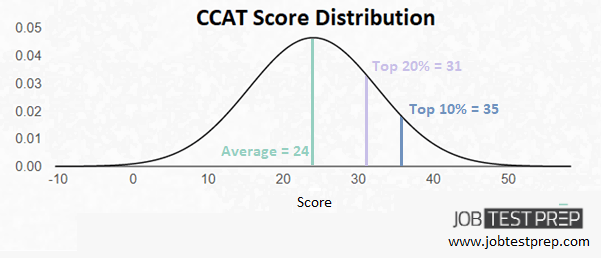To learn more about the CCAT test, read the Complete CCAT Test Guide and tips for 2025.
For CCAT practice questions with full answers, take our free CCAT practice test.
How Is the CCAT Scored?
After completing the CCAT, you will get a raw score – a score from 0 to 50 which represents the number of correct answers in your CCAT test.
Then, this score will be converted to a percentile score – which measures how your score compares to others who have taken the test. A percentile score of 80 means that your score is above that of 80% of test-takers.
Below you can find a table to convert your raw CCAT score to a percentile score.
The passing score is determined by the employer for each position. Any candidate scoring above the passing score will move on to the next stage. Below you can find a table of estimated CCAT passing scores by position.
For more scoring methods, you can observe our Wonderlic Test Scores Guide or ASVAB Scores Guide.
What is a Good Score on CCAT?
A good score on the CCAT depends on the job you apply for. However, as a rule of thumb, a score at the top 20% of candidates is considered a good score. On the CCAT, that score is around 31. A score of 42 will put you on the top scale for ANY job the CCAT tests for.
For comparison, the average CCAT score is 24.
Elevate Your CCAT Score—Unlock Your Dream Job!
Perfect your CCAT performance with practice designed for busy professionals like you. Our CCAT PrepPack makes exam preparation engaging, effective, and straightforward:
- Real Test Simulation: Experience 6 timed practice tests that replicate the pressure and pace of the actual CCAT.
- Step-by-Step Guidance: Enjoy friendly, easy-to-follow explanations that demystify each question.
- Progress You Can Measure: Watch your score improve with each simulation as you build essential skills.
- Career Boost: A higher CCAT score can be your key to landing that dream job.
What Score Do I Need on the CCAT?
Your CCAT passing score depends on your position and employer, as it is determined specifically for each and every position.
However, the following table, based on an official CCAT sample score report can help you get a good idea of the required passing score for the position you are after.
| Job | CCAT Passing Score | Job | CCAT Passing Score |
| Accounting/Finance | 24-39 | Loan Officer | 24-38 |
| Administrative | 20-39 | Network Admin | 23-37 |
| Analyst | 26-42 | Operations Manager | 22-40 |
| Bookkeeper | 20-35 | Product Manager | 26-41 |
| Computer Programmer | 23-40 | Production Manager | 18-34 |
| Controller | 24-39 | Project Manager | 22-37 |
| Customer Service | 18-32 | Recruiter | 21-35 |
| Finance Manager | 21-40 | Sales (Manager) | 23-37 |
| Financial Analyst | 23-38 | Sales (Rep) | 21-35 |
| Front Dest | 18-30 | Senior Manager/VP | 29-42 |
| Lawyer | 29-42 | Store Manager | 20-37 |
Comparing Your CCAT Score to the Competition
According to Criteria Corp, the CCAT test provider, the average CCAT score is 24, and the standard deviation is 8.58.
Below you can see the CCAT results distribution:

The following table shows your percentile score based on the number of correct answers (out of 50):
| CCAT Correct Answers | You Are Above % of the Population |
| 8 | 3% |
| 12 | 8% |
| 16 | 17.5% |
| 20 | 32% |
| 24 | 50% |
| 28 | 68% |
| 31 | 80% |
| 36 | 92% |
| 40 | 97% |
| 44 | 99% |
| 50 | 99.9% |
What Do CCAT Scores Mean?
Your CCAT score will reflect your cognitive ability on each of the three test sections (verbal, spatial, and math & logic), as well as an overall score. These CCAT results determine your problem-solving and quick thinking capacities compared with candidates for the job you are after.
The Smart Way to Aim at a CCAT Score
See the two bold numbers in the table above? These are the average score (24), and the score of the 80th percentile (31) – often considered the passing score for most positions.
As you can see, the difference between them is only seven (7) correct answers - basically the difference between failing and passing.
However, when reaching around 36 correct answers, additional answers have a much smaller effect, and the difference between 36 and 50 (the highest possible score), is only 8 percentage points.
What does that mean? Well, two things:
- You should aim at the score YOU NEED right from the start.
- Utilizing smart time management techniques is one of the best things you can do to improve your CCAT result.
3 Tips for a High CCAT Score
Here are 3 tips to improve your CCAT score from our CCAT Smart Solver Guide:
#1 – Take a Few Extra Seconds per Question
As mentioned above, the effect of additional correct answers is maximal around the 25-35 score range, and rapidly decreases after 36.
As such, it is better to settle for a set number of questions and do your best with them, than aiming at getting all 50 correct (a nearly impossible task).
If you could (theoretically), take more time to solve 36 questions right and disregard the other 14 completely, you would be much better off than going faster through all 50 questions and solving only 25.
#2 – Stuck? Guess and Move on!
There are no points reduced for wrong answers in the CCAT. If you find yourself struggling too long with a single question – don’t waste your time – guess and move on.
#3 – Pay Attention to Your Personal Pitfalls
Every person has his or her time management issues. Some get greedy, some rush through questions and make foolish mistakes.
Being aware of where you personally need to improve will greatly influence your score and give you those 6-7 precious additional correct answers. These will eventually get you a passing score and most importantly, a job.
Some More CCAT Solving Tactics
These are only some of the score-maximizing tactics you will learn on the Complete CCAT Prep Course and Smart Solver Guide:
- Should I put more effort into the beginning of the test or near the end?
- Should I leave questions unanswered and get back to them later?
- Which CCAT test section matters the most?
- And more…
Ace the CCAT and Land Your Dream Job!
Your career ambitions deserve the best preparation. Our CCAT PrepPack is your friendly partner in mastering the exam and enhancing your job prospects:
- True-to-Test Experience: Practice with 6 realistic simulations of 50 questions in 15 minutes—just like the real exam.
- Detailed Feedback: Receive clear explanations to refine your techniques and boost your confidence.
- Progressive Improvement: See steady improvements from your very first simulation, with standout gains in later tests.
- Career-Ready Confidence: Elevate your CCAT score to impress employers and move forward in your career.
- 5 full-length CCAT practice tests
- 27 additional math practice tests
- 17 additional verbal practice tests
- 24 additional abstract practice tests
- 7 additional logic practice tests
- Step-by-step explanations
- CCAT solving tips
- CCAT Time management guide
- Normalized scores for all levels
- One-time payment
- Money-Back Guarantee




